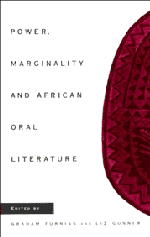Book contents
- Frontmatter
- Contents
- List of contributors
- Preface
- Note on transcription
- 1 Introduction: power, marginality and oral literature
- Part I Orality and the power of the state
- Part II Representing power relations
- Part III Oral forms and the dynamics of power
- Part IV Endorsing or subverting the paradigms: women and oral forms
- 11 Sexuality and socialisation in Shona praises and lyrics
- 12 Nontsizi Mgqwetho: stranger in town
- 13 Clashes of interest: gender, status and power in Zulu praise poetry
- 14 Jelimusow: the superwomen of Malian music
- Part V Mediators and communicative strategies
- Bibliography
- Index
14 - Jelimusow: the superwomen of Malian music
Published online by Cambridge University Press: 18 December 2009
- Frontmatter
- Contents
- List of contributors
- Preface
- Note on transcription
- 1 Introduction: power, marginality and oral literature
- Part I Orality and the power of the state
- Part II Representing power relations
- Part III Oral forms and the dynamics of power
- Part IV Endorsing or subverting the paradigms: women and oral forms
- 11 Sexuality and socialisation in Shona praises and lyrics
- 12 Nontsizi Mgqwetho: stranger in town
- 13 Clashes of interest: gender, status and power in Zulu praise poetry
- 14 Jelimusow: the superwomen of Malian music
- Part V Mediators and communicative strategies
- Bibliography
- Index
Summary
Juddies [jeliw] … have a perfect resemblance to the Irish Rimer … [they sing] the auncient stocke of the King, exalting his antientry, and recounting over all the worthy and famous acts by him … singing likewise extempore upon any occasion is offered … whereby the principal may bee pleased … If at any time the Kings or principall persons come unto us trading in the River, they will have their musicke playing before them.
(Jobson 1968: 133–4)Three hundred and fifty years have passed since Richard Jobson's vivid encounter with the jeliw, the hereditary professional musicians of the Manding peoples of West Africa. Though the kings have long since gone, the jeliw are still a conspicuous part of Manding culture, and their behaviour has not changed significantly. Their flamboyant performance style, their fine music and their ambivalent social status have been the subject of much comment from the fourteenth century onwards. Travellers, explorers, scholars and journalists have documented the multi-faceted roles of jeliw as praise singers, dancers, public orators, interpreters, historians, genealogists, mediators, and political and social advisers. What remains largely unwritten, however, is the story of female jeliw — the jelimuso (pl: jelimusow).
The jeliw are part of the nyamakala, a caste of hereditary endogamous craftsmen, which includes smiths, leatherworkers and Koranic reciters and praisers.
- Type
- Chapter
- Information
- Power, Marginality and African Oral Literature , pp. 197 - 208Publisher: Cambridge University PressPrint publication year: 1995
- 7
- Cited by



